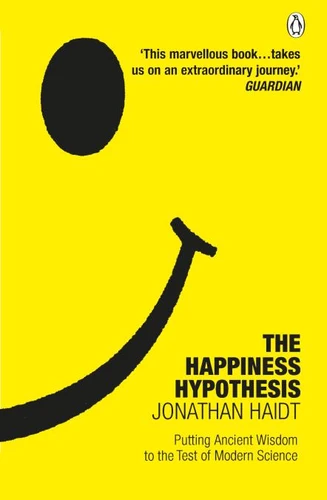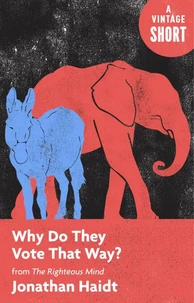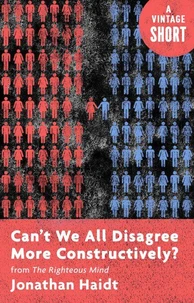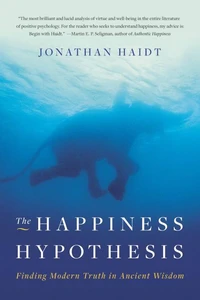The Happiness Hypothesis. Putting Ancient Wisdom to the Test of Modern Science
Par :Formats :
Disponible dans votre compte client Decitre ou Furet du Nord dès validation de votre commande. Le format ePub protégé est :
- Compatible avec une lecture sur My Vivlio (smartphone, tablette, ordinateur)
- Compatible avec une lecture sur liseuses Vivlio
- Pour les liseuses autres que Vivlio, vous devez utiliser le logiciel Adobe Digital Edition. Non compatible avec la lecture sur les liseuses Kindle, Remarkable et Sony
- Non compatible avec un achat hors France métropolitaine
 , qui est-ce ?
, qui est-ce ?Notre partenaire de plateforme de lecture numérique où vous retrouverez l'ensemble de vos ebooks gratuitement
Pour en savoir plus sur nos ebooks, consultez notre aide en ligne ici
- Nombre de pages320
- FormatePub
- ISBN978-1-4481-6668-8
- EAN9781448166688
- Date de parution18/06/2015
- Copier Coller02 page(s) autorisée(s)
- Protection num.Adobe DRM
- Infos supplémentairesepub
- ÉditeurCornerstone Digital
Résumé
Every culture rests on a bedrock of folk wisdom handed down through generations. The pronouncements of philosophers are homespun by our grandmothers, and find their way into our common sense: what doesn't kill you makes you stronger. Do unto others as you would have done unto you. Happiness comes from within. But are these 'truths' really true? Today we all seem to prefer to cling to the notion that a little bit more money, love or success will make us truly happy.
Are we wrong?In The Happiness Hypothesis, psychologist Jonathan Haidt exposes traditional wisdom to the scrutiny of modern science, delivering startling insights. We learn that virtue is often not its own reward, why extroverts really are happier than introverts, and why conscious thought is not as important as we might like to think... Drawing on the rich inspiration of both philosophy and science, The Happiness Hypothesis is a remarkable, original and provocative book - ancient wisdom in our time.
Are we wrong?In The Happiness Hypothesis, psychologist Jonathan Haidt exposes traditional wisdom to the scrutiny of modern science, delivering startling insights. We learn that virtue is often not its own reward, why extroverts really are happier than introverts, and why conscious thought is not as important as we might like to think... Drawing on the rich inspiration of both philosophy and science, The Happiness Hypothesis is a remarkable, original and provocative book - ancient wisdom in our time.
Every culture rests on a bedrock of folk wisdom handed down through generations. The pronouncements of philosophers are homespun by our grandmothers, and find their way into our common sense: what doesn't kill you makes you stronger. Do unto others as you would have done unto you. Happiness comes from within. But are these 'truths' really true? Today we all seem to prefer to cling to the notion that a little bit more money, love or success will make us truly happy.
Are we wrong?In The Happiness Hypothesis, psychologist Jonathan Haidt exposes traditional wisdom to the scrutiny of modern science, delivering startling insights. We learn that virtue is often not its own reward, why extroverts really are happier than introverts, and why conscious thought is not as important as we might like to think... Drawing on the rich inspiration of both philosophy and science, The Happiness Hypothesis is a remarkable, original and provocative book - ancient wisdom in our time.
Are we wrong?In The Happiness Hypothesis, psychologist Jonathan Haidt exposes traditional wisdom to the scrutiny of modern science, delivering startling insights. We learn that virtue is often not its own reward, why extroverts really are happier than introverts, and why conscious thought is not as important as we might like to think... Drawing on the rich inspiration of both philosophy and science, The Happiness Hypothesis is a remarkable, original and provocative book - ancient wisdom in our time.



















